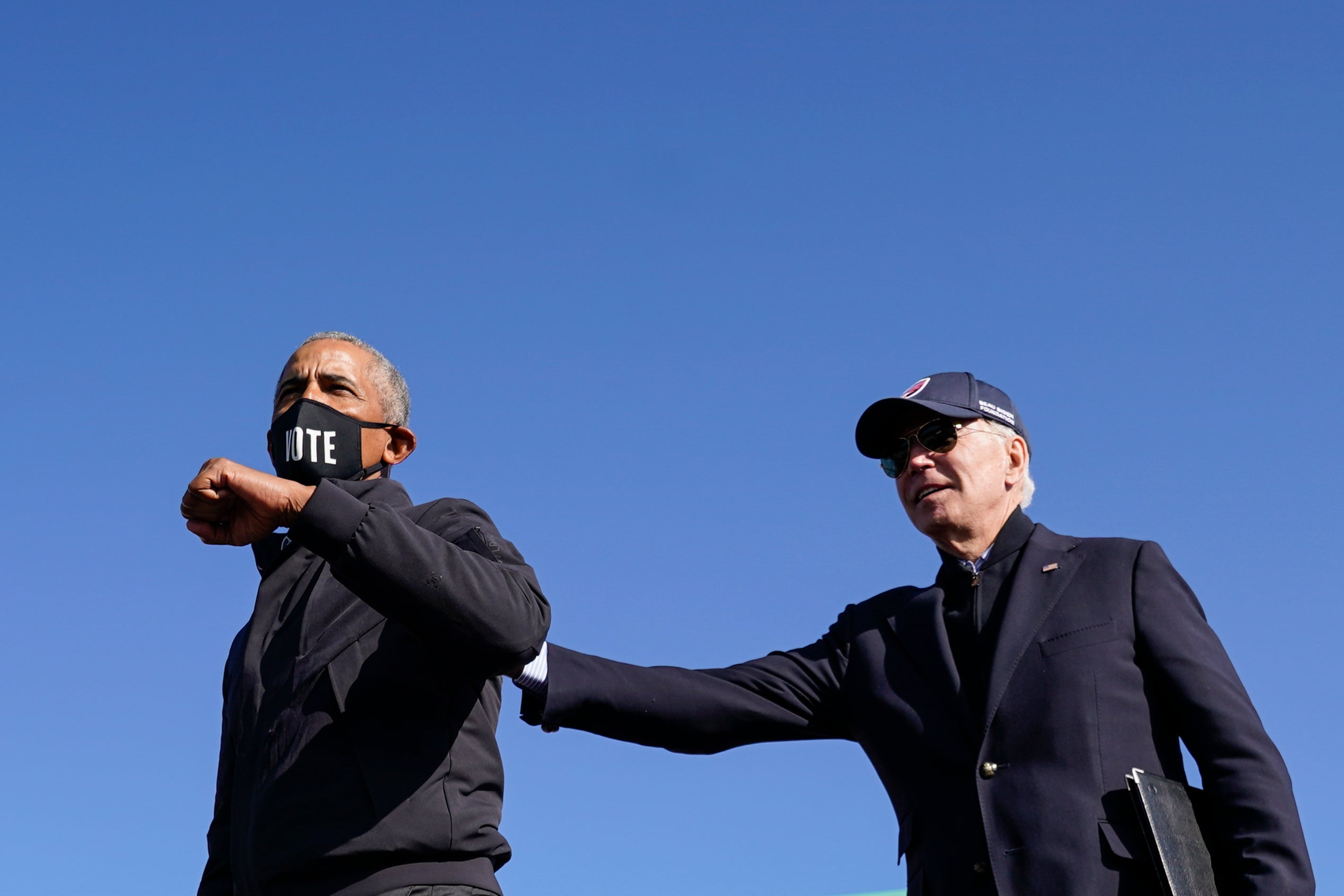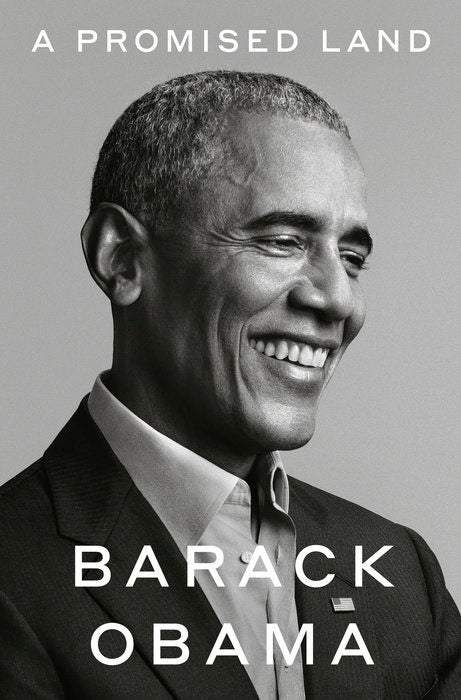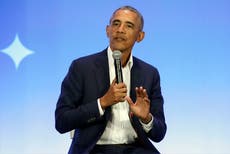‘Joe was all warmth’: Obama’s new book stops short of analysing Biden
If you’re looking for a deep insight into Barack Obama’s thoughts about Joe Biden, you’ll be disappointed. The book stops short of revealing how he really feels about his former partner, writes Steven Levingston

Your support helps us to tell the story
From reproductive rights to climate change to Big Tech, The Independent is on the ground when the story is developing. Whether it's investigating the financials of Elon Musk's pro-Trump PAC or producing our latest documentary, 'The A Word', which shines a light on the American women fighting for reproductive rights, we know how important it is to parse out the facts from the messaging.
At such a critical moment in US history, we need reporters on the ground. Your donation allows us to keep sending journalists to speak to both sides of the story.
The Independent is trusted by Americans across the entire political spectrum. And unlike many other quality news outlets, we choose not to lock Americans out of our reporting and analysis with paywalls. We believe quality journalism should be available to everyone, paid for by those who can afford it.
Your support makes all the difference.Former president Barack Obama sprinkles his new memoir with some kind words for his onetime wingman Joe Biden. “Joe had heart,” he writes in A Promised Land. “He had endured unimaginable tragedy. . . Joe was decent, honest, and loyal. I believed he cared about ordinary people.” But haven’t we heard all this before? In one form or another, Obama has uttered these plaudits again and again.
Over eight years, he and Biden forged a historic White House friendship: no president and vice president had ever grown so close and demonstrated such affection for each other. If anyone could provide special insight into our new president-elect, Obama surely would be that person. But you won’t find much enlightenment on Biden as presidential buddy, or as incoming Oval Office occupant, in the pages of Obama’s memoir. The book stops short of revealing how Obama really feels about his former partner. Don’t look here for deep introspection on our 46th president or even a recognition of the so-called bromance that enthralled a large swath of the American public. This first volume of the president’s memoirs ends in 2011, before the relationship hit its emotional peak amid the illness and death of Biden’s son Beau, and Obama’s awarding of the Medal of Freedom to Biden days before the inauguration of Donald Trump. Perhaps the president’s promised second volume will explore the breadth of the friendship.
In these pages, the praise of Biden is largely descriptive – neither analytical nor revelatory. “Joe was all warmth,” Obama writes. “You could see it as he worked a room, his handsome face always cast in a dazzling smile (just inches from whomever he was talking to), asking a person where they were from, telling them a story about how much he loved their hometown.” That’s fine writerly language, but it raises deeper questions: How did Biden’s innate warmth affect their relationship? What did Obama learn from it? What, in turn, did Biden gain personally from his relationship with Obama? The answers would give us a sharper picture of each man and provide meaningful intelligence on our next president.
During the 2008 Democratic primary contest, Biden stumbled into a racially charged blunder when he told a reporter that his then-rival Obama was “articulate and bright and clean and a nice-looking guy”. Obama dispenses with the incident in a single sentence, noting that the phrase was “surely meant as a compliment, but interpreted by some as suggesting that such characteristics in a Black man were noteworthy”. His reason for mentioning it at all is to observe that Biden's “lack of a filter periodically got him in trouble”. In this, Obama resorts to the obvious rather than risking the incisive. Why doesn’t he describe how he really felt at the time? In fact, he scolded Biden for suggesting that other Black leaders were inarticulate, but then he quickly forgave him. What had he seen in Biden that encouraged him to absolve his opponent? Did Obama act out of mere political expediency? Or was he swayed by Biden’s power of persuasion – a profitable trait now for an incoming president who may face an intractable Senate? Obama sheds no light.
When I was researching my book Barack and Joe: The Making of an Extraordinary Partnership, I had many questions about both men, but they denied my interview requests. So I turned to their aides for answers. The closest I got to understanding Obama’s reaction to Biden’s racial gaffe was an analysis given to me by Obama adviser David Axelrod. “Obama didn’t go to a darker place in his interpretation of what was said,” Axelrod told me. Instead, he accepted Biden as Biden. Obama told Axelrod: “I understand what Joe meant. I know what’s in his heart.”
Axelrod’s perspective points to another hoped-for revelation that A Promised Land might have given us: How did Biden’s heart speak to Obama? Knowing this, readers would have an inkling of how Biden might rely on his heart – and mind – to navigate the fractious racial and political climate he’ll inherit as president.
Biden is portrayed in the memoir largely as a man who served his boss well. We see him as a guy who asked tough questions in important meetings
A few months into the Obama presidency, African American Harvard professor Henry Louis Gates Jr was arrested for alleged disorderly conduct in Cambridge, Massachusetts, when someone reported him for supposedly breaking into his own house. Amid the swirl of controversy – stoked by Obama, who said the police had acted “stupidly” – the president invited Gates and the arresting officer, Sgt James Crowley, to the White House for a beer. Then three participants inexplicably turned into four. “Six days later,” Obama writes, “Joe Biden and I sat down with Sergeant Crowley and Skip Gates at the White House for what came to be known as the ‘Beer Summit.’” It confounded me while researching my book, and again while reading Obama’s, why Biden suddenly was added to the guest list. Kate Bedingfield, White House communications specialist, told me for my book that the beer fest “was a fraught and tough situation” – the kind that played to the vice president’s social skills. “The vice president has an uncanny ability to cut through to the real human emotion and understand where others are coming from,” she explained.
But perhaps there was more to it. Georgetown University professor Michael Eric Dyson, an eloquent voice on racial relations (who eventually wrote the forward to my book), had a provocative interpretation: Biden was indispensable, given the Black president’s famous taciturnity on race. Around the Beer Summit table, Biden could not only be a unifying White emissary but also give voice to issues of injustice and discrimination that Obama preferred to sidestep. “Biden had Black resonances in a way, ironically enough, that he brought to bear to the benefit of Barack Obama, the Black man,” Dyson said. Noting that Obama’s upbringing in Hawaii and Indonesia left him in some ways deficient in certain parts of Black life and culture, Dyson argued that Biden “was more intimately familiar with some rituals of American blackness than Obama was.” Biden’s racial bona fides were so deeply established that “the perception was that the blackest man in the White House was the white guy.”

More than a decade later, Obama is more comfortable articulating America’s racial complexities than he was during his time in the White House. In his discussion of the Beer Summit, he gives a thoughtful analysis of the “humiliations and inequities” that Black people experience every day, lacing in the “multiple occasions” when police stopped him for no reason or security guards followed him in department stores. If Obama mentions Biden only in passing, it’s understandable given that Biden has never experienced these day-to-day indignities. But the vice president’s inclusion in the Beer Summit showed Obama’s faith that Biden is capable of navigating the delicate intersection of black and white sensitivities, an important quality he brings to the White House at a time when the nation is in desperate need of racial reckoning.
Biden is portrayed in the memoir largely as a man who served his boss well. We see him as a guy who asked tough questions in important meetings and was, as we’ve heard numerous times, the last person in the room when Obama needed to make crucial decisions. But mostly Biden crosses these pages as just one member of a team of advisers.
In truth, he was much more than that. Given the president’s journey with his vice president, it’s a fair assumption that Obama has collected some profound observations on Biden as a man, leader and now incoming president. In the memoir, Obama is bracingly honest about the hardships of governance and the political realities of being president; he is eloquent on his life as father, husband and son. He analyses the exploits of his aides and makes clear that he feels comfortable with people who share his qualities. Tim Geithner, the treasury secretary, Obama writes, had “a reserve that I recognised in myself”. Of David Plouffe, his 2008 campaign manager, he observes that “the two of us had much in common. We were both analytical and even-keeled”. Of his vice president, he writes, “We couldn’t have been more different”. So different, perhaps, that Biden defied Obama’s ready perspicacity. In A Promised Land, the president gazes mostly from a distance at his vice president. He lacks, or holds close to the vest, his conclusions about Biden, portraying him largely in prosaic, one-dimensional images.
Perhaps it shouldn’t be a surprise that the tale of the twosome remains mostly off-screen. The star of this show is Obama. He has expended considerable sweat on many yellow pads to construct a literary scaffolding on which to build his legacy. Yet the blunted portrait of Biden – Obama's “brother in arms”, as one of his advisers described him to me – is a loss for all of us wishing to know this perceptive observer’s unique insights into our next president.
A Promised Land by Barack Obama. Penguins Books, £35.
Levingston, nonfiction editor of The Washington Post, is the author of “Barack and Joe: The Making of an Extraordinary Partnership.”
© The Washington Post




Join our commenting forum
Join thought-provoking conversations, follow other Independent readers and see their replies
0Comments